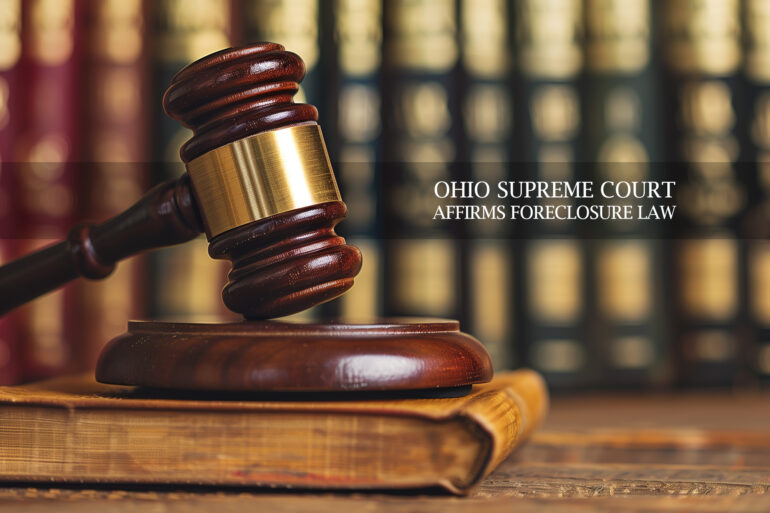Ohio Supreme Court Affirms Law Regarding Administrative Foreclosures
Ohio’s Supreme Court addressed concerns regarding the constitutionality of the administrative or Board of Revision (BOR) foreclosure process often used in Montgomery and Cuyahoga County. Critics of this expedited foreclosure process believe it is unfair and equates to an “unconstitutional government seizure” of a debtor’s property because it provides the homeowner will no compensation for equity.
Administrative foreclosures typically involve having a county board of revision give abandoned properties to a local land bank or a similar organization that will facilitate a sale. County BORs are best known for their role as arbitrators or judges in property tax disputes. In most of these disputes, homeowners believe that the county’s latest property appraisal is inflated, resulting in excessive property taxes.
During this expedited foreclosure process, any tax liens are cleared so the property may be sold and the owner essentially forfeits any equity they had in the property.
Chief Justice Maureen O’Connor and Justice Patrick Fischer acknowledged flaws in the administrative foreclosure method, stating that the ruling relied on “circular reasoning” that lacks justification and felt the scheme is “unsettling” and seemingly “wrong.”
Why Did Ohio Counties Implement the Administrative or BOR Foreclosure Process?
One of the major contributors to the Great Recession in the U.S., which spanned a period from approximately December 2007 to June 2009, was a mortgage crisis that resulted in home vacancy, abandonment, and blight in many residential neighborhoods throughout Ohio. Former Ohio Attorney General Marc Dann stated that the BOR foreclosure was initially a “good faith” solution, which was established for the betterment of Ohio communities; yet, resulted in consciously “stealing people’s equity.”
The administrative or BOR foreclosure process is an alternative used in lieu of the typically judicial foreclosure method, particularly in situations where a home is vacant and abandoned. The BOR may find that the complexity of a case makes it inappropriate for this option and transfer the matter to the local court for the judicial process.
To proceed with this foreclosure method, the BOR must determine that the following are true:
- The property involved does meet the definition of abandoned and delinquent land.
- The homeowners do owe the property taxes, and they remain delinquent, thus foreclosure is appropriate.
- If the total of the debts (impositions) against the home exceeds the property’s assessed fair market value.
Summary of Ohio Case No. 2018-1307 Feltner v. Cuyahoga County
Let’s review the facts of the Feltner case, which was ultimately heard by Ohio’s Supreme Court.
Mr. Feltner, a landowner in the Cleveland area, lost his home in a foreclosure, which was valued at roughly $144,500 at the time. Feltner owed more than $65,000 in taxes. Instead of a judicial process with a sheriff sale, the property was transferred to the Land Bank and sold to a private party for $15,000, meaning that Feltner received no compensation for his equity in the home and the state received minimal compensation for the tax debt.
All of the Supreme Court justices ruled for the county in this matter, as they found no basis for determining that the process was unconstitutional based on state statutes. However, Chief Justice Maureen O’Connor and Justice Patrick Fischer acknowledged flaws in the administrative foreclosure method, stating that the ruling relied on “circular reasoning” that lacks justification and felt the scheme is “unsettling” and seemingly “wrong.”
In a report from Eye on Ohio, BOR foreclosures peaked in 2019 in Montgomery and Cuyahoga County. During this period in these two counties, more than $11 million was lost in potentially recoverable taxes and property owners lost more than $77 million in home equity.
The Ohio Legislative Service Commission (LSC) explains that counties generally view proceeding with tax foreclosures as a last resort.
Recent Potential Changes
Ohio House Bill 85, introduced in 2023, seeks to extend the use of land banks as a means of handling delinquent property by ensuring they have the “right of first refusal to purchase” occupied property. Why? Here, the goal is to retain the current tenants (renters), who are victims of absentee landlords who continually collect rent yet pay no property taxes.
Contained within HB 85 is R.C. 5722.032, which would require land banks to either pay the outstanding property taxes or the fair market value of the property — whichever is greater. If the fair market value exceeds the property tax debt, the former owner may pursue the recovery of proceeds based on their prior equity in the home. As of May 2024, the bill remains pending in the House.
Properties in the pre-foreclosure stage or REOs (bank-owned) are highly feasible opportunities for investors in Ohio.
Alternative Tax Collection Methods to Avoid Tax Foreclosures
Real property taxes in Ohio are paid twice a year (semiannually), with installments due in December and June. Both penalties and interest apply when taxes are not paid by the due date.
The Ohio Legislative Service Commission (LSC) explains that counties generally view proceeding with tax foreclosures as a last resort. The preferred means of resolving tax delinquencies involves the homeowner and county treasurer entering a delinquent tax contract, which is an extended installment agreement. These contracts represent evidence of how the state makes good faith efforts to assist property owners experiencing financial difficulties and prevent foreclosures.
Delinquent tax contracts create an installment payment plan that may extend for up to five years. During the term of the contract, no further interest or penalties are imposed on the property owner; however, the county will promptly proceed with foreclosure if payments are not made as agreed.
In some instances, property owners will acknowledge that the repayment contract option is not feasible. Here, the property owner may surrender the property to a land bank, often called a county land reutilization corporation (CLRC), which handles the sale of the property and recovers the tax debt.
Can a Property Owner in Foreclosure Reclaim a Home?
A homeowner named in a foreclosure has an opportunity to reclaim or “redeem” their property until the confirmation of sale or transfer is filed. The property owner must pay the full debt associated with the foreclosure and costs incurred during the process.
Should Real Estate Investors Consider Purchasing Ohio Properties in Foreclosure?
Experienced investors often successfully capitalize on foreclosure opportunities, yet your timing is critical. Properties that have already entered the administrative (BOR) foreclosure process in Ohio are likely among the most challenging for potential buyers because Ohio’s process is inherently efficient, and these counties often move quickly.
Properties in the pre-foreclosure stage or REOs (bank-owned) are highly feasible opportunities for investors in Ohio. Purchasing homes in these phases is often quite similar to the process involved in a standard home sale. However, inexperienced investors might want to have some assistance in navigating these opportunities. For example, you might find yourself competing against exclusively cash buyers who are often willing to purchase unseen properties.








